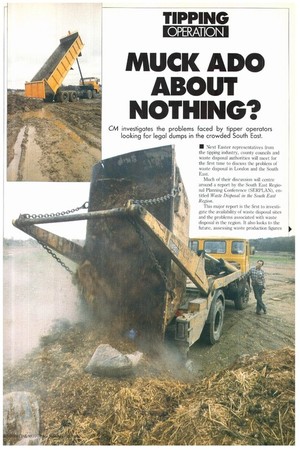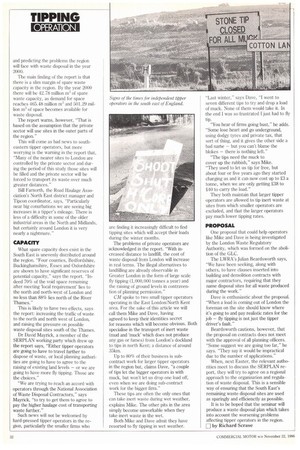MUCK ADO ABOUT NOTHING?
Page 33

Page 34

If you've noticed an error in this article please click here to report it so we can fix it.
CM investigates the problems faced by tipper operators looking for legal dumps in the crowded South East.
• Next Easter representatives from the tipping industry, county councils and waste disposal authorities will meet for the first time to discuss the problem of waste disposal in London and the South East.
Much of their discussion will centre around a report by the South East Regional Planning Conference (SERPLAN), entitled Waste Disposal in the South East R rgion.
This major report is the first to investigate the availability of waste disposal sites and the problems associated with waste disposal in the region. It also looks to the future. assessing waste production figures
and predicting the problems the region will face with waste disposal in the year 2000.
The main finding of the report is that there is a slim margin of spare waste capacity in the region. By the year 2000 there will be 42.78 million nil of spare waste capacity, as demand for space reaches 465.48 million mi and 501.29 million m3 of space becomes available for waste disposal.
The report warns, however, "That is based on the assumption that the private sector will use sites in the outer parts of the region."
This will come as bad news to southeastern tipper operators, but more worrying is the warning in the report that, "Many of the nearer sites to London are controlled by the private sector and during the period of this study those sites will be filled and the private sector will be forced to transport its waste over much greater distances."
Bill Farnorth, the Road Haulage Association's North East district manager and Tipcon coordinator, says, "Particularly near big conurbations we are seeing big increases in a tipper's mileage. There is less of a difficulty in some of the older industrial areas in the North and Midlands, but certainly around London it is very nearly a nightmare."
CAPACITY What spare capacity does exist in the South East is unevenly distributed around the region. "Four counties, Bedfordshire, Buckinghamshire, Essex and Oxfordshire are shown to have significant reserves of potential capacity," says the report. "Indeed 70% of the void space remaining after meeting 'local requirement' lies to the north and north-west of London and no less than 88% lies north of the River Thames," This is likely to have two effects, says the report: increasing the traffic of waste to the north and north west of London, and raising the pressure on possible waste disposal sites south of the Thames.
Dr David Mayrick, a member of the SERPLAN working party which drew up the report says, "Either tipper operators are going to have to travel further to dispose of waste, or local planning authorities are going to have to agree to the raising of existing land levels — or we are going to have more fly tipping. Those are the choices."
"We are trying to reach an accord with operators through the National Association of Waste Disposal Contractors," says Mayrick, "to try to get them to agree to pay the higher haulage cost of transporting waste further."
Such news will not be welcomed by hard-pressed tipper operators in the region, particularly the smaller firms who are finding it increasingly difficult to find tipping sites which will accept their loads during the winter months.
The problems of private operators are acknowledged in the report. "With increased distance to landfill, the cost of waste disposal from London will increase in real terms. The illegal alternatives to landfilling are already observable in Greater London in the form of large scale fly tipping (1,000,000 tonnes a year) and the raising of ground levels in contravention of planning permission."
CM spoke to two small tipper operators operating in the East London/North Kent area. For the sake of this article we will call them Mike and Dave, having
agreed to keep their identities secret for reasons which will become obvious. Both specialise in the transport of inert waste (mud and 'muck' which does not produce any gas or fumes) from London's dockland to tips in north Kent: a distance of around 35km.
Up to 80% of their business is subcontract work for larger tipper operators in the region but, claims Dave, "a couple of tips let the bigger operators in with muck, but won't let us drop one load off, even when we are doing sub-contract work for the bigger firm."
These tips are often the only ones that can take inert waste during wet weather, explains Mike. The other pits in the area simply become unworkable when they take inert waste in the wet.
Both Mike and Dave admit they have resorted to fly tipping in wet weather. "Last winter," says Dave, "I went to seven different tips to try and drop a load of muck. None of them would take it. In the end I was so frustrated I just had to fly tip.
"You hear of firms going bust," he adds. "Some lose heart and go underground, using dodgy tyres and private tax, that sort of thing, and it gives the other side a bad naffie — but you can't blame the blokes — there is nothing left."
"The tips need the muck to cover up the rubbish," says Mike.
"They used to let us tip for free, but about four or five years ago they started charging us and it can now cost up to £3 a tonne, when we are only getting £38 to £40 to carry the load."
They both maintain that larger tipper operators are allowed to tip inert waste at sites from which smaller operators are excluded, and that the larger operators pay much lower tipping rates.
PROPOSAL One proposal that could help operators like Mike and Dave is being investigated by the London Waste Regulatory Authority, which was formed on the abolition of the GLC.
The LWRA's Julian Beardsworth says, "We have been seeking, along with others, to have clauses inserted into building and demolition contracts with major contractors, requiring that they name disposal sites for all waste produced during the work."
Dave is enthusiastic about the proposal. "When a load is coming out of London the foreman on the site should know where it's going to and pay realistic rates for the job — fly tipping is not just the tipper driver's fault."
Beardsworth cautions, however, that the proposal on contracts does not meet with the approval of all planning officers. "Some suggest we are going too far," he says. "They say it would be impractical due to the number of applications."
When, next Easter, the relevant authorities meet to discuss the SERPLAN report, they will try to agree on a regional approach to the organisation and regulation of waste disposal. This is a sensible way of ensuring that the South East's remaining waste disposal sites are used as sparingly and efficienctly as possible.
It is to be hoped that the seminar will produce a waste disposal plan which takes into account the worsening problems affecting tipper operators in the region. D by Richard Scrase




















































































